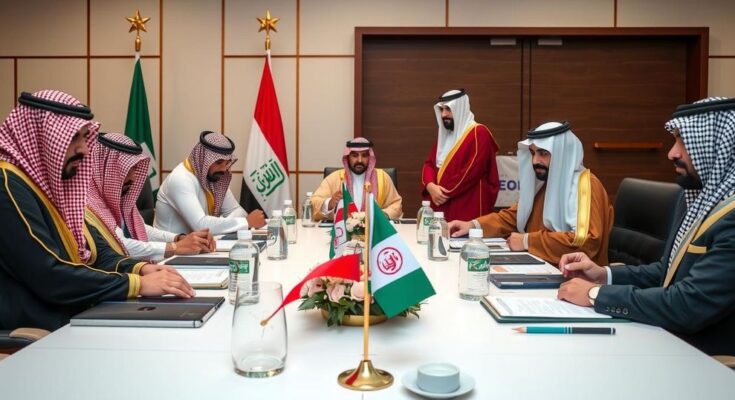Western and Arab leaders gathered in Saudi Arabia to discuss the future of Syria following President Bashar al-Assad’s ouster. The focus was on potential sanctions relief to aid humanitarian efforts and economic recovery. Syrian Foreign Minister Asaad Hassan al-Shaibani emphasized the need for lifting longstanding sanctions. The meeting included various high-ranking officials from the U.S. and Europe, as well as discussions on easing barriers to reconstruction and humanitarian aid.
A significant assembly of foreign ministers and high-ranking diplomats from Western nations and the Middle East convened in Riyadh, Saudi Arabia, to deliberate on the future of Syria in the aftermath of President Bashar al-Assad’s ouster. The gathering marked the first regional dialogue since al-Assad’s departure, focusing particularly on potential sanctions relief. Syria’s new Foreign Minister, Asaad Hassan al-Shaibani, arrived with an agenda emphasizing the urgent need for lifting longstanding sanctions to foster international financial assistance to Damascus.
The conference, which featured representatives from nations including Saudi Arabia, Egypt, the United Arab Emirates, and Turkiye, also included high-profile figures from the United States and Europe, notably Under Secretary of State John Bass, German Foreign Minister Annalena Baerbock, and British Foreign Secretary David Lammy. With the new administration led by Hayat Tahrir al-Sham (HTS) taking shape, there is a growing call to ease sanctions to facilitate humanitarian aid and economic recovery.
Analyst Rob Geist Pinfold commented, “The Biden administration and European countries are ‘moving in the direction the HTS wants them to go in terms of removing sanctions, or at least freezing sanctions.'” This comes after the U.S. issued a six-month sanctions exemption for transactions involving Syrian governing institutions, aiming to mitigate the impact of sanctions on humanitarian efforts. Discussions on relaxing sanctions at the European Union level are also ongoing, focusing on alleviating barriers to rebuilding infrastructure and accessing financial services.
As discussions continue, Germany’s Foreign Minister reaffirmed that sanctions aimed at al-Assad’s allies must remain intact due to their involvement in serious crimes during the conflict. Following the swift overthrow of al-Assad, the HTS has established a caretaker government, presenting a new challenge for international relations and diplomacy in addressing Syria’s political landscape.
This meeting is significant as it symbolizes a shift in regional diplomacy, acknowledging the new Syrian leadership while seeking a collaborative approach to address the pressing humanitarian needs and economic stabilization. Saudi Arabia leads this crucial dialogue, building upon prior discussions held in Rome and Jordan that highlighted concerns regarding recognition and the requirements from the new Syrian rulers.
The recent ousting of President Bashar al-Assad from power in Syria has created a pivotal moment in both regional and international politics. Following al-Assad’s departure, there has been an urgent need to reassess existing economic sanctions against Syria, which many believe hinder humanitarian efforts and reconstruction. The emergence of the HTS as the new regime raises concerns as well as opportunities for diplomatic engagement, particularly as the international community navigates the complexities of recognizing this new government while addressing the aftermath of the civil war. The Saudi-led meeting aims to unify regional and Western perspectives on these issues and lay the groundwork for future assistance to Syria as it grapples with its tumultuous transition.
In conclusion, the gathering of Western and Arab foreign ministers in Saudi Arabia underscores a critical juncture for Syria following President al-Assad’s ouster. The calls for sanctions relief reflect an urgent need for humanitarian assistance and economic stability in a country struggling amidst conflict. As the HTS assumes leadership, the international community faces challenges and opportunities in forging diplomatic relations, ensuring that any policy changes are both ethical and effective in addressing the dire circumstances faced by the Syrian population.
Original Source: www.aljazeera.com




